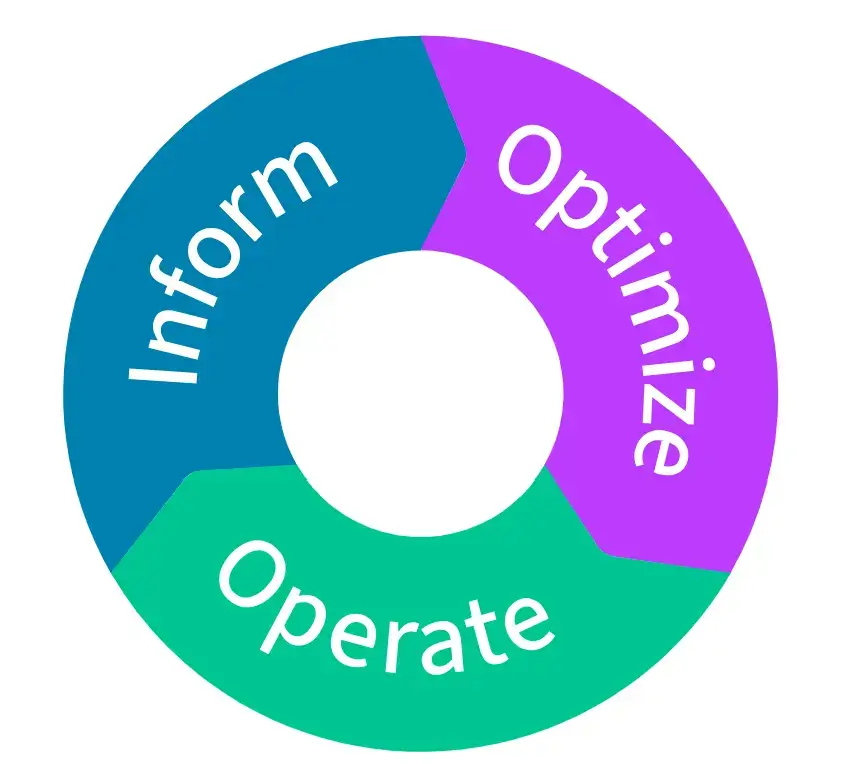FinOps is a strategic approach to managing cloud costs. It combines financial management best practices with operational efficiency. This alignment empowers organizations to make informed decisions quickly that optimize costs without compromising performance.
| “Most FinOps practitioners can attest to the financial agility and investment optimization the model brings. However, not all are aware of the creative ways they can leverage it beyond cost savings.” – Jacob Saunders, EVP of Professional Services, Atmosera |
Beyond its role in cost management, FinOps creates a culture where every department focuses on using resources well. A FinOps-powered culture lets teams try new things and be creative because they know the financial management system supports quick and smart decisions.
If you’re interested in leveraging this operating model to enhance your business agility, consider this article your starting point. We’ll review how to implement FinOps at your organization and ways to reap long-term benefits from the framework.
How to Implement FinOps at Your Organization
Before you can reap the benefits of FinOps, you need to implement it. Since FinOps is a business strategy and not a specific tool, the steps of implementation can be somewhat subjective based on how you conduct business. Still, there is a general roadmap and set of best practices that you can follow.
Establish a Cross-Functional Team
Start by forming a team with members from finance, operations, and IT. This team will lead your FinOps efforts. Their diverse expertise ensures decisions benefit from multiple perspectives.
Define Your FinOps Goals
Set clear, achievable goals for what you aim to accomplish with FinOps. Having specific targets will guide your strategy. Consider the FinOps phases and how your team will leverage them to achieve your goals post-implementation.

The FinOps Phases cycle by the FinOps Foundation
Implement Budgets & Forecasts
Develop budgets for cloud spending and forecast future needs. This helps prevent overspending and ensures funds are allocated efficiently. Regularly review and adjust these budgets to stay aligned with your goals.
Establish a Cost Allocation Strategy
Plan to allocate cloud costs to specific departments, projects, or teams. This makes individuals or teams accountable for their cloud usage, and promotes a culture of cost awareness and responsibility.
Optimize Existing Resources
Analyze your current cloud usage to identify underutilized resources and cost savings opportunities. Consolidating or decommissioning these can lead to immediate cost savings. Encourage ongoing optimization as a routine practice.
Educate & Empower Your Teams
Equip your team with the knowledge and tools they need for effective FinOps practices. Education drives empowerment, allowing for better decision-making and cost management.
Monitor, Measure, and Adjust
Continuously monitor cloud spending against your goals. Use metrics to measure success and make necessary adjustments to your strategy. This iterative process ensures ongoing improvement and alignment with business objectives.
| Learn About More Ways to Save Money on Your Cloud Resources: |
How The FinOps Strategy Enhances Financial Decision-Making
The FinOps strategy ensures that every dollar spent on the cloud is invested in achieving your business objectives. This is because it encourages everyone on your team to be conscious about cloud financial management.
It provides real-time visibility into cloud computing expenditures. This means you can see exactly where and how your money gets spent on cloud services. Such detailed insights allow for pinpointing inefficiencies and identifying opportunities for cost reduction.
Additionally, the FinOps practice merges financial and operational data. So, you get a comprehensive view of how cloud resources drive business value. This integration helps you decide where to invest more and where to scale back.
Innovative Ways to Use FinOps to Accelerate Business Growth
FinOps is usually promoted as a cost-saving strategy. However, leveraging for business model innovation efforts is an increasingly common practice. Here are ways you can use it for that purpose.
Drive Revenue
By optimizing cloud costs, you can lower the price of your services, making them more competitive and appealing to customers. This strategy can lead to increased market share and higher revenues.
Enhance Customer Experiences
FinOps enables you to dynamically scale cloud resources based on customer demand. This flexibility ensures that your products or services remain fast and reliable, even during peak usage.
Make Informed Expansion Decisions
Utilize FinOps analytics to assess the cost-effectiveness of expanding into new markets or launching new services. This data-driven approach ensures that expansion decisions are grounded in financial reality.
Accelerate Time to Market
By removing financial barriers and improving resource allocation FinOps can help you bring products to market faster. You can also redirect savings from cloud cost optimizations to fund research and development projects.
Support Sustainability Initiatives
Apply FinOps to manage and optimize the energy efficiency of your cloud usage. By reducing unnecessary resource consumption, you not only save costs but also support sustainability goals. This practice can improve your brand’s reputation and further drive revenue, as 78% of consumers favor sustainable brands.
Optimize Your Cloud Cost Management Practices With Expert Advice
Successful business models usually combine frameworks in a way that suits their needs. As such, consider FinOps as one tool in your arsenal. You’ll still need additional cloud computing and financial strategies to drive an innovative business.
Atmosera is the perfect partner to manage your Azure environment with FinOps best practices confidently.

